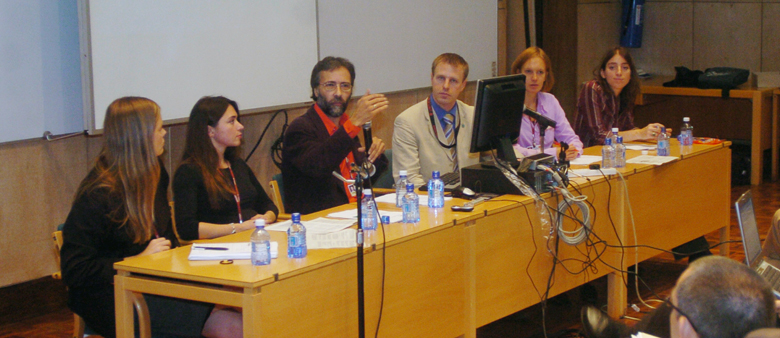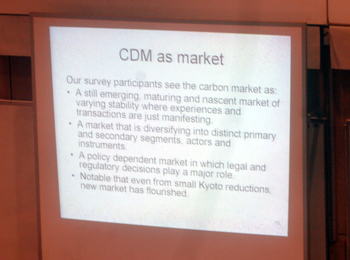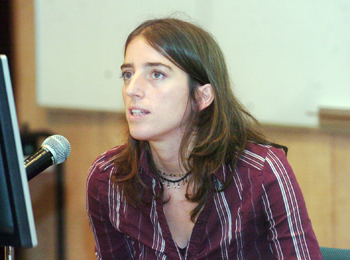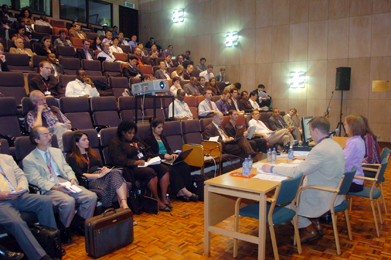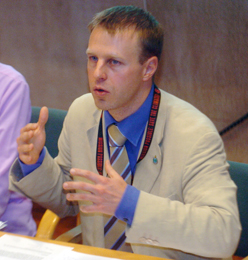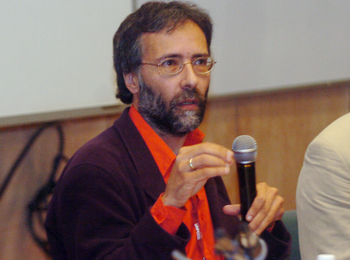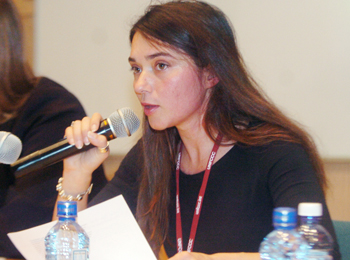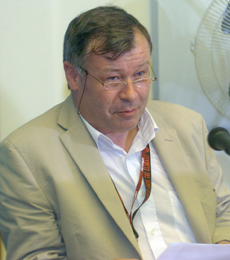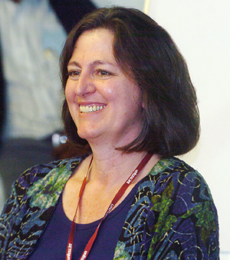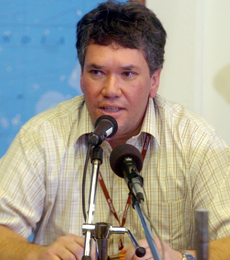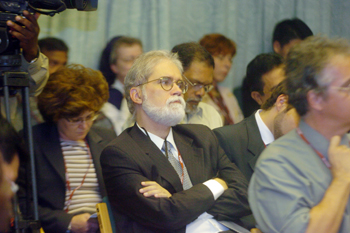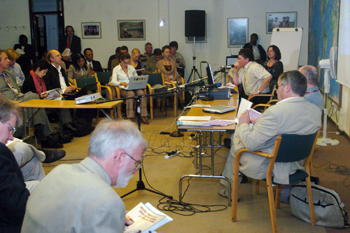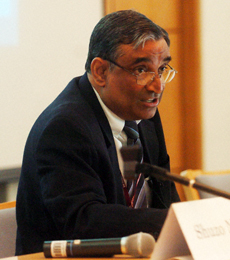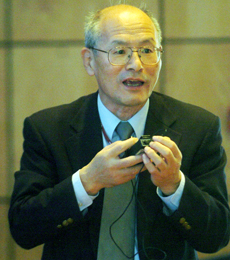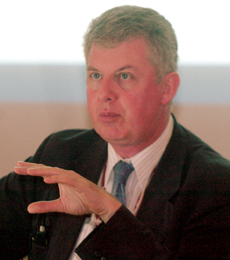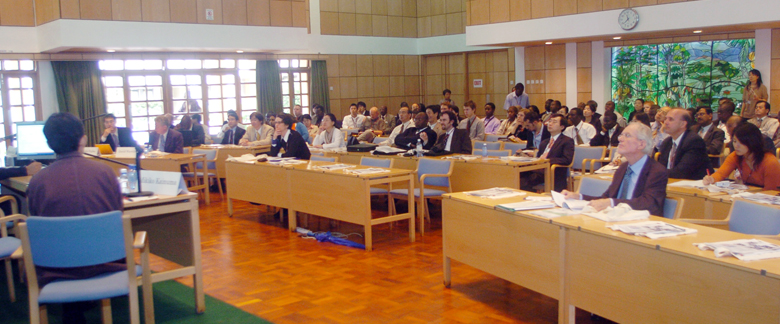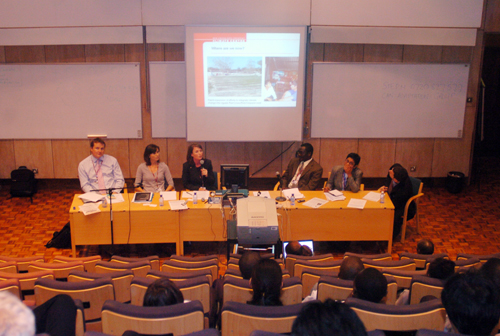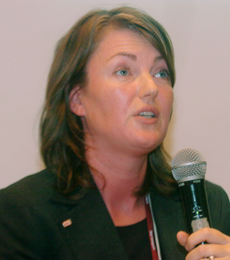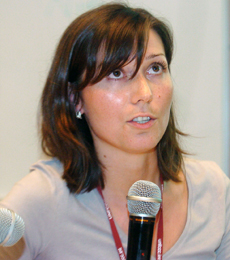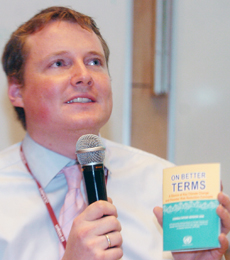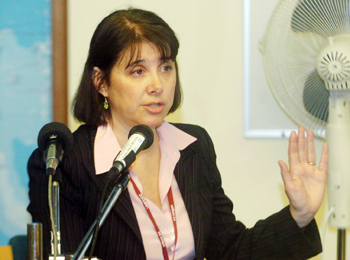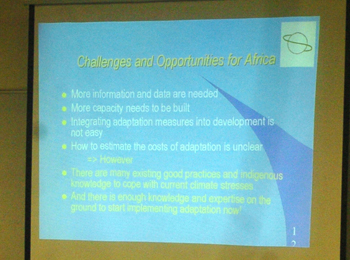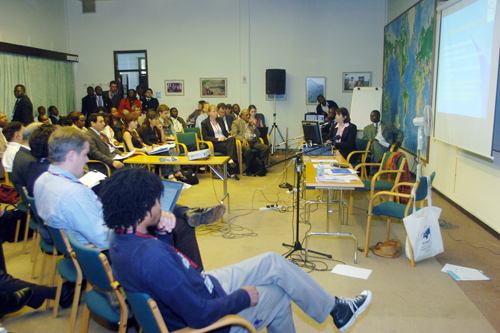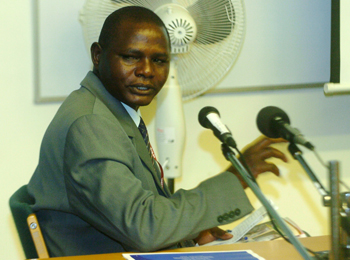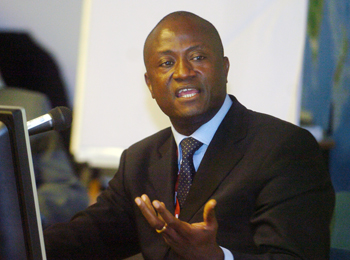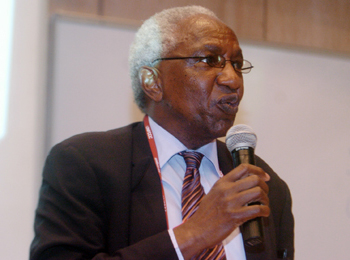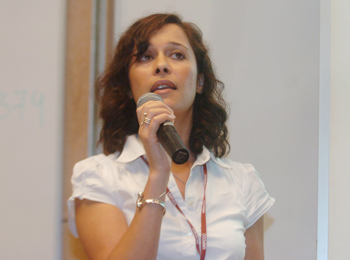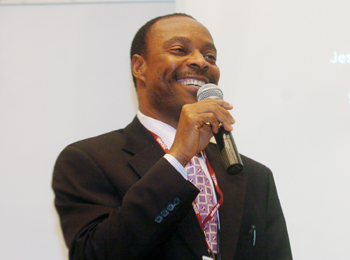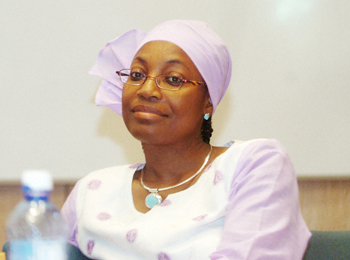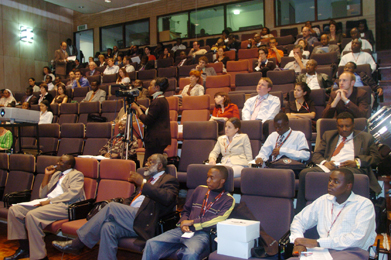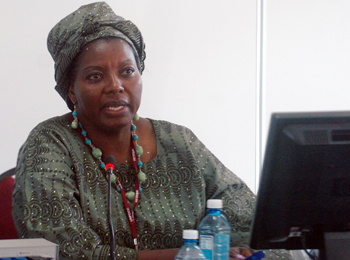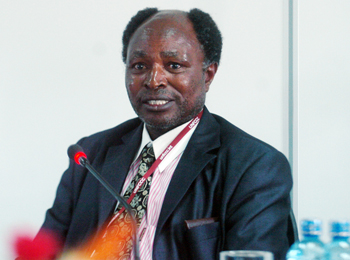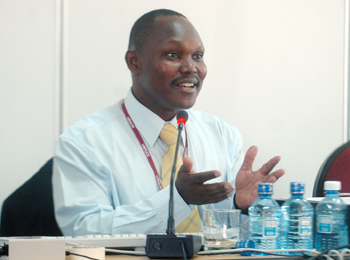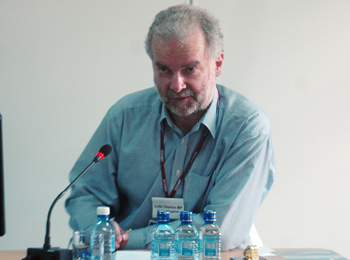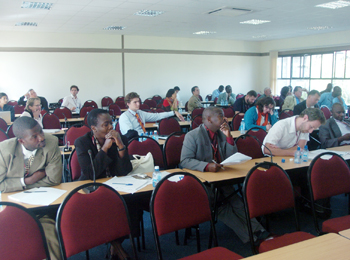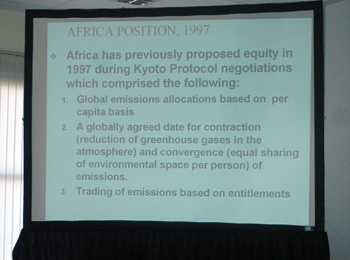 |
||
|
Published by the International Institute for Sustainable Development (IISD)
|
|||
|
A Special Report on Selected Side Events at the Second Conference of the Parties serving as the Meeting of Parties to the Kyoto Protocol (COP/MOP 2) and Twelfth Conference of the Parties (COP 12) to the UN Framework Convention on Climate Change (UNFCCC)
|
|||||
| 6-17 November 2006 | Nairobi, Kenya | |||||
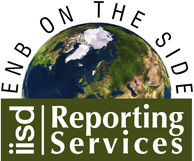 |
|||
 |
|||
Events convened on Wednesday, 8 November 2006
|
The future of the CDM stakeholder views of the role of the CDM in a future regime Presented by University of Potsdam |
|||
|
Gudrun Benecke, University of Potsdam, introduced an ongoing research project at her University that examines new modes of governance in areas of limited statehood, focusing on CDM. She said the project aims to analyze the conditions of emergence of CDM partnerships based on a survey of stakeholders engaged in CDM.
Miriam Schröder, University of Potsdam, overviewed the CDM market, and elaborated on the CDM stakeholder survey. She highlighted the key research questions focused on the experience of the stakeholders in the carbon market, reasons and modes of their engagement, the strengths and weaknesses of the CDM market and future reforms. Benecke elaborated on the main findings of the survey, including that: for the EU-ETS companies, CDM is a way of risk management for hedging their carbon strategy; for the intermediaries, CDM adds to their public relations strategy; and for some of the EU governments, CDM presents an export opportunity. Schröder added that perceived strengths of CDM include mainstreaming climate change issues in the business sector via a pricing mechanism and technology and capital transfer to developing countries. She highlighted some perceived weaknesses of CDM, including burdensome financial additionalities and CDM’s questionable contribution to sustainable development and adaptation. Lars Friberg, University of Potsdam, noted that the CDM market is booming in the short-term, but pointed out that, given the uncertainty of the post-2012 CDM could be a market bust in the medium term. Kate Hampton, Climate Change Capital, noted that further developing the post-2012 architecture will enhance to sustainable development. She highlighted the need for developing better regulations and compliance measures for the post-2012 CDM. Lucy Haydenova, Dutch Ministry of Housing, Spatial Planning and the Environment, noted that the current CDM market is more diversified than before and that there is need for legal support and harmonization of rules. Christoph Bals, GermanWatch, noted that additionality is a problem for business investors, but is important for safeguarding CDM’s integrity. He said that CDM is an innovative financing instrument for adaptation and highlighted its potential as an incentive system for delivering equitable benefits. |
|||
|
|||
|
Integrating ethics into climate change negotiations Presented by Tides Center |
|||
|
Nancy Tuana, Pennsylvania State University, said the Programme on the Ethical Dimension of Climate Change (EDCC) was established at COP 10, in Buenos Aires, and launched the EDCC White Paper on the Ethical Dimensions of Climate Change. She summarized the paper’s conclusions and noted it seeks to identify the factual context and convergence issues among ethical theories.
Donaldo Brown, Pennsylvania Consortium for Interdisciplinary Environmental Policy, emphasized that allocating emissions targets among nations is a classic problem of distributive justice and more dialogue taking this into account is needed. He concluded that: it is unethical for a nation to wait to take action on the basis that new and less costly technologies are on the horizon; and that each nation has an ethical duty to support stabilizing GHGs in the atmosphere at the lowest possible levels unless the victims of climate change consent to higher levels of emissions. Benito Müller, Oxford Climate Policy, noted the need for developed countries to overcome the “taboo” of looking at liability and compensation issues related to climate change. He noted that moral responsibility addresses “who has to pay and how much should be paid.” Jon Rosales, St. Lawrence University, addressed the issue of “can we wait for new less costly technologies, ” and added that the longer countries wait to take action, the worse will be the adverse effects. He said that those who delay action should be responsible for harms caused by the delay, stressing that it is “better to start sooner rather than later.” |
|||
|
|||
|
Global challenges toward a low-carbon society through sustainable development Presented by NIES |
|||||
|
Ryutaro Yatsu, Japan’s Ministry of Environment, outlined a joint United Kingdom (UK)/Japan project towards a low-carbon society (LCS), explaining the key project objectives include finding ways to focus on LCS in developing countries and exploring possible integration of LCS and sustainable development. PR Shukla, Indian Institute of Management, highlighted the importance of aligning climate change with sustainable development. He stressed that climate change is a derivative problem of development and that strategies for dealing with sustainable development and climate change have many common elements that could deliver co-benefits. Shukla suggested shifting the “frontier” through innovations in technology, institutions and mainstreaming climate change. Junichi Fujino, NIES, suggested modeling LCSs to identify “trend-breaking” options. David Warrilow, Department for Environment, Food and Rural Affairs, UK, highlighted implications for achieving deep cuts in global emissions, which need a long-term policy framework that integrates sustainable development and require a comprehensive range of technologies and political leadership. Stanford Mwakasonda, University of Cape Town, South Africa, stated that sustainable development policies and measures (SD-PAMs) offer an opportunity for developing countries to engage in emission reduction efforts. Martin Weiss, Federal Environmental Agency, Germany, highlighted Germany’s avoidance of 84 mega tonnes of carbon emissions in 2005, and informed that Germany’s target for renewable energy is to contribute to 50% of the total energy supply by 2050. |
|||||
|
|||
|
Adaptation and disaster risk reduction in practice: country studies and new initiatives Presented by UN/ISDR |
|||||
|
Martin Owor, UN International Strategy for Disaster Reduction (UN/ISDR), Africa Outreach, highlighted the importance of sharing knowledge on existing mechanisms to reduce risk to climate change.
Elike van Sluis, Red Cross/Red Crescent Climate Centre, highlighted lessons learned from pilot projects and capacity building initiatives for strengthening communities’ adaptive capacities through disaster risk reduction, including that locally-based disaster risk reduction provides cost-effective adaptation, and link short- and long-term perspectives. John Harding, UN/ISDR Secretariat, summarized the Vulnerability and Adaptation Resource Group (VARG) case studies carried out for identifying opportunities and barriers for managing current and future climate risks. Henny Osbahr, University of Oxford, underscored the conclusions of the VARG study in Kitui District, Kenya. She noted progress made in Kenya toward integration of climate risk considerations, including improved early warning systems and structural coordination frameworks, and existence of a strong science community in Nairobi. Tom Mitchell, Institute for Development Studies, presented the booklet “On better terms: a glance at key climate change and disaster risk reduction concepts,” which is dedicated to practitioners and aims at enhanced communication on the ground and summarizes a few IPCC and UN/ISDR definitions on the issue. Noroarisoa Rakotondrandria, UN/ISDR, Africa Outreach, described the UN/ISDR disaster risk reduction mechanism of implementation and its National Platform, which is a coordinative and participatory mechanism. She emphasized the Platforms’ importance for building capacity and assisting countries in integrating risk reduction plans in their national development plans. |
|||||
|
|||
|
Adaptation action: GEF-financed adaptation activities Presented by GEF |
|||
|
Bonizella Biagini, Global Environment Facility (GEF), provided an overview of GEF assistance to adaptation under the GEF Trust Fund and the new climate change funds, namely the Least Developed Countries Fund (LDCF) and the Special Climate Change Fund (SCCF). She explained the differences between the GEF Trust Fund and the new funds, including in co-financing.Biagini noted that under the new funds, projects do not need to demonstrate global benefits and are mostly focused on development.
Alexandre Cabral, UNFCCC Focal Point, Guinea Bissau, highlighted project objectives and results of an adaptation pilot project funded by the GEF Strategic Priority on Adaptation (SPA), entitled “Adaptation to Climate and Coastal Change in West Africa.” He explained that the project sought to identify: vulnerable zones and hot spots within pilot project sites in five countries; possible causes of coastal degradation; socioeconomic and environmental impacts; and obstacles to implementation of improved management. Daniel Mbuvi, Arid Lands Resource Management Project, Kenya, described the SPA-funded pilot project “Reduced Vulnerability to Increase Community Resilience to Drought in Makueni District,” which strives to increase household food security, reduce poverty and facilitate the integration of climate change in sustainable development. He cited challenges, including convincing communities of the direct link between climate change and the recent frequency of disasters. Participants clarified that the Resource Allocation Framework does not apply to the LDCF, SCCF or SPA and discussed how to deliver lessons learned from adaptation pilot projects given the site specificity of such lessons. |
|||
|
|||
|
Introducing Climate Change Adaptation in Africa: a new programme for research and capacity development Presented by IDRC |
|||
|
Shem Wandiga, Advisory Board Chair, Climate Change Adaptation in Africa (CCAA), noted that adaptation is an issue of national importance.
Jessica Troni, UK Department for International Development (DfID), presented on DfID’s approach to climate change, highlighting some of the findings of the Stern Review relating to adaptation. She underscored the importance of engaging in climate risk screening and adaptation options analysis. She outlined DfID’s climate change research strategy, noting that there is a need for developing country ownership of research results. Anthony Nyong, IDRC, provided a background on adaptation research under CCAA and noted some relevant lessons learned for successful adaptation, such as the importance of communities taking the lead on adaptation and promoting dialogue between diverse stakeholders. Fatima Denton, IDRC, outlined the concepts and processes behind the CCAA project. She noted that the CCAA scoping exercise revealed the need for enhanced adaptation, interlinking fragmented initiatives, identification of policy conduits for translating research into action and demand-driven research. She noted that the CCAA process identifies participatory action research as a key vector of action, and elaborated CCAA’s efforts on capacity-building activities, including its work on concept notes, curriculum development and training and support networks. Participants discussed the need for advocacy measures and aligning CCAA with the New Partnership for Africa’s Development process and questioned ways to identify the poor and the vulnerable in Africa. |
|||
|
|||
|
Post-Kyoto regime: options for Africa Presented by the government of Kenya |
|||
|
Grace Akumu, Climate Network Africa, explained that developing countries would like to determine how to participate meaningfully in climate change mitigation while meeting their sustainable development goals. Noting that only five African projects have been registered by the CDM Executive Board to date, she suggested that CDM may not be the best tool to achieve this goal.
A. Muusya Mwinzi, National Environment Management Authority, Kenya, read a speech on behalf of Kivutha Kibwana, Kenya’s Minister of Environment and Natural Resources and COP 12 President, which emphasized the need to include the principle of equity in post-Kyoto discussions and suggested that: the post-Kyoto regime include emissions entitlements on a per capita basis which converge over time and which can be traded on a global market; developing countries demand the transfer of relevant energy technologies; and climate change be addressed in a way that reflects the different capabilities of parties. Colin Challen, UK Member of Parliament, highlighted the need to develop a truly global post-Kyoto framework in a timely manner. He cautioned that Africa could be left out of negotiations as developed countries continue to focus more on China and India. Joshua Wairoto, Kenya Meteorological Department, re-emphasized the potential role of emission entitlements trading, stating that “trading is better than begging” and aid is “dehumanizing and humiliating.” He argued that the African Union should get involved in negotiations and, responding to a participant question, noted that it has recently started work in this direction. |
|||
|
|||
|
||
|
Click the above button to go back to our ENB main coverage
|
||
|
|
|
|
|
||
|
